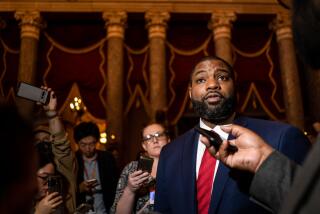A Legacy That King Would Not Have Wanted
- Share via
On countless occasions, President Clinton has talked of his deep appreciation of the legacy of Dr. Martin Luther King Jr. in the struggle for peace and social justice. But there’s another part of the King legacy that Clinton can’t appreciate. In a perverse irony, many of Bill Clinton’s harshest political enemies have been Southern Republicans who owe their current political power to King and the civil rights movement.
For nearly a century following the collapse of Reconstruction in the 1880s, the Republican Party was virtually extinct in the South. As late as 1964, not one of the 41 congressional representatives from the five Deep South states was Republican. The barrage of civil rights marches, demonstrations, sit-ins and protests that battered down the legal barriers of segregation during the early 1960s changed that.
Republican presidential candidate Barry Goldwater rode the first tide of white backlash in 1964, opposing the civil rights bill, railing against big government and championing states’ rights. At the 1964 Republican convention, 366 of the 375 Southern delegates backed Goldwater.
King strongly denounced the bigotry of the Goldwater campaign and worked tirelessly to rally black voters against the Republicans. He correctly saw that the wave of newly enfranchised black voters would energize the racially moribund Democratic Party. But he also realized that many white Democrats were unreconstructed segregationists and race-baiters who would stampede into the Republican Party after the passage of the civil rights bill. He predicted that they would be major political players in the South for years to come.
Republican presidents Richard Nixon, Ronald Reagan and George Bush saw the same political possibilities. They milked the Southern strategy for all it was worth with generous doses of racially tinged code words, including slaps at big government and rants against civil rights and social programs, and by ignoring black voters and actively courting whites.
The new breed of Southern Republican congressional leaders such as Senate Majority Leader Trent Lott of Mississippi and the defrocked Newt Gingrich of Georgia and Reps. Lindsey O. Graham of South Carolina, Bob Barr of Georgia and Dick Armey of Texas and independent counsel Kenneth Starr, who is from Texas, who are spearheading the charge to dump Clinton, all cut their political teeth on the anti-federal government, anti-civil rights and anti-social programs movement in the South.
Even worse for Clinton, the Southern Republicans have had the political clout to get their way. During the impeachment debate, they occupied 82 out of the 228 Republican seats in the House. They form the biggest and most unified political bloc and marched in near total lock step in voting for all four articles of impeachment, two of which passed.
King did not panic at the racial counterassault he foresaw from white Southern politicians. His antidote was to create alliances with whites and other nonblacks, to conduct massive voter turnouts, to intensify political organizing and to make sure black elected officials were effective advocates for minority needs within both parties and not just serving as mouthpieces for Democrats.
King would have been pleased to see that many blacks turned out in big numbers in last November’s election and that their votes made a big difference in state and local elections in the South. He would have loudly condemned impeachment as part of the strategy by the Southern Republicans to roll back civil rights, further gut social programs and win the White House in 2000.
And almost certainly King would have been among the first to hit the streets to protest the Southern Republicans’ naked power grab. This would have been his way to partially undo a part of his legacy that he did not want.
More to Read
Get the L.A. Times Politics newsletter
Deeply reported insights into legislation, politics and policy from Sacramento, Washington and beyond. In your inbox twice per week.
You may occasionally receive promotional content from the Los Angeles Times.










